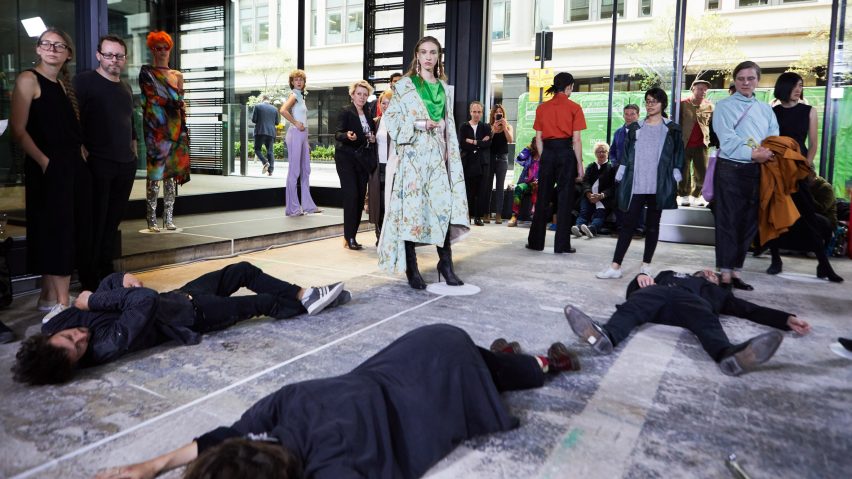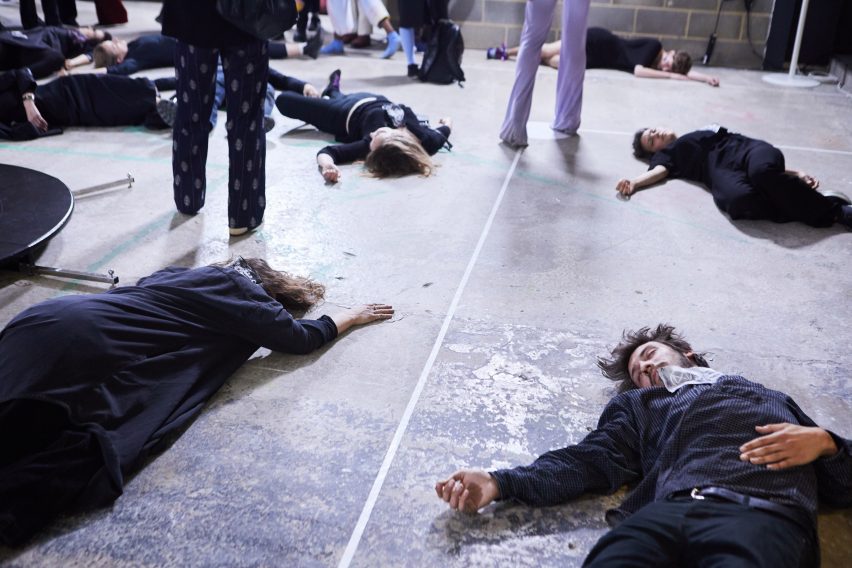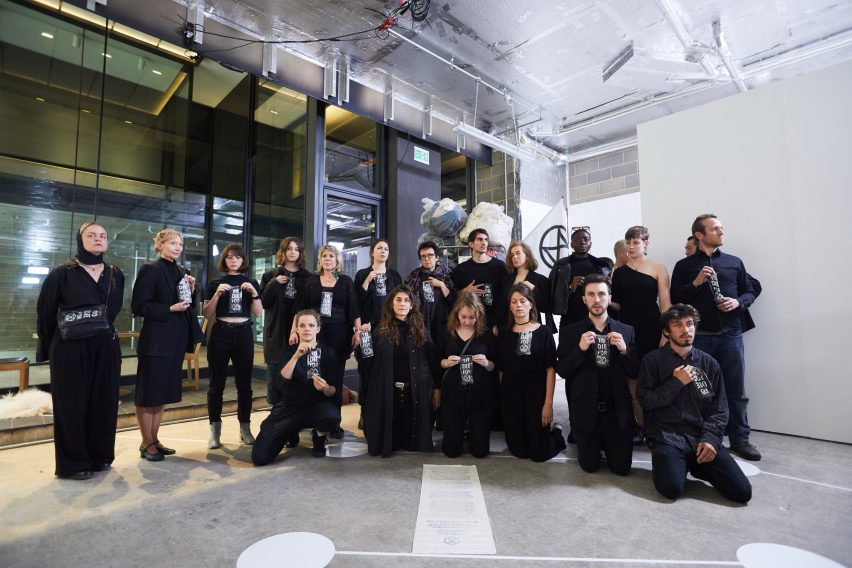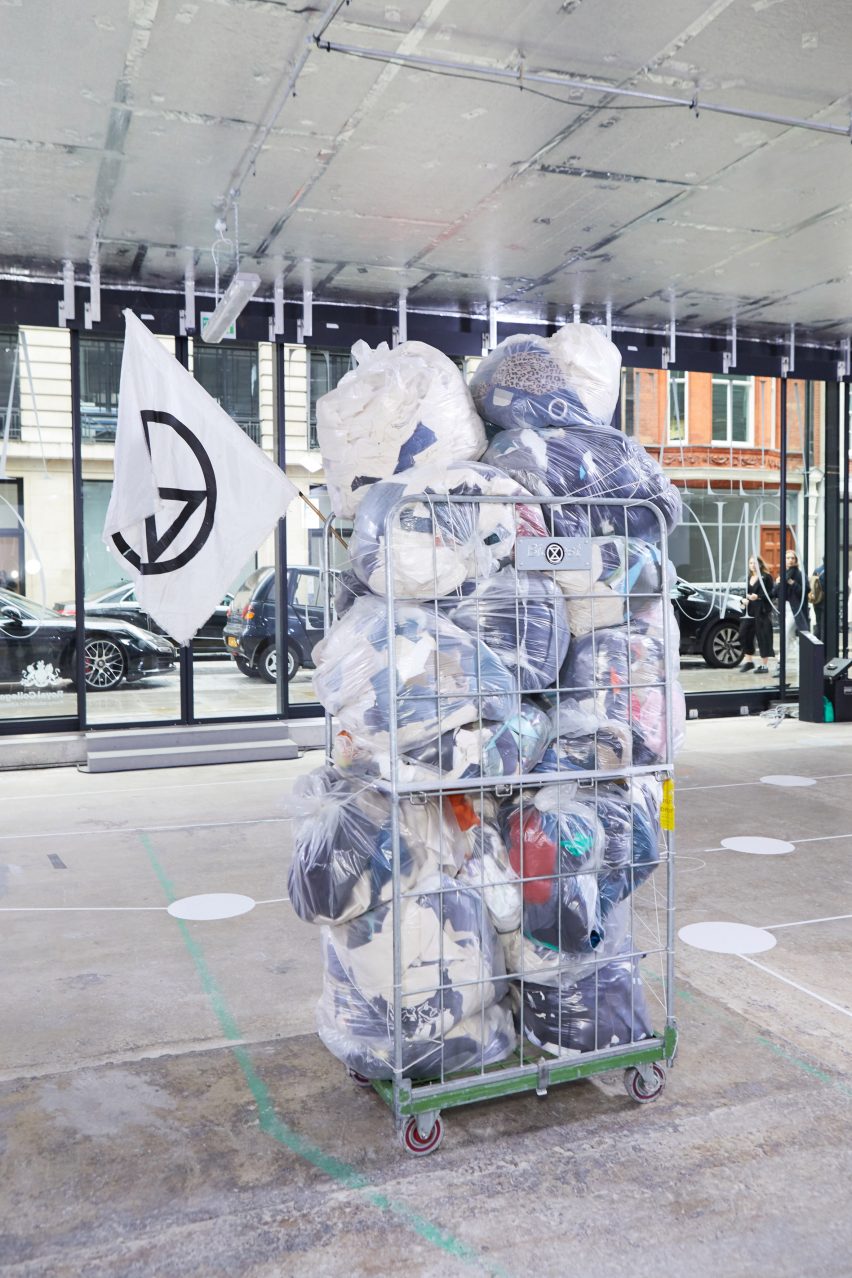
"There is no fashion on a dead planet" says RCA grad who refused to make final collection
Royal College of Art fashion student Laura Kraup Frandsen has refused to present a physical collection at her graduate show as a protest against overconsumption in the climate crisis.
Instead of a final clothing collection, the MA Fashion Womenswear student staged a "die-in" demonstration at her degree show with the help of 20 Extinction Rebellion members dressed in their own clothes.
She hopes this will encourage people to support the movement's #BoycottFashion drive that asks consumers to sign a pledge to not buy any new clothes for a year.

"By creating a sharp visual contrast between 'dead' people lying on the floor and models walking over them, I wanted people to face the reality of what our consumer behaviour will lead to," Frandsen told Dezeen.
"Asking the question: is fashion to die for?"
Global fashion industry is hugely polluting
The designer believes that we need to come to terms with the crisis, in light of the climate emergency declared by the UK Parliament last month.
Following research into the environmental impact of the global fashion industry, she made the decision to not add more clothes to an already oversaturated market in protest at its waste.
According to UN Climate Change reporting, the fashion industry contributes to around 10 per cent of global greenhouse gas emissions, consuming more energy than the aviation and shipping industry combined.

"The most dangerous assumption about the climate crisis is that someone else is going to solve it," said Frandsen. "The worst thing we can do is to carry on as usual."
"We are in the middle of an ecological breakdown, and we have already destroyed half of the world's arable land," she continued. "We are consuming the planet and ourselves to death. We already have an abundance of clothes – we don't need more."
"In the next 30 years we will need to grow 50 per cent more food, and in the same timeframe we could experience complete soil eradication. How can we still justify using and destroying land to produce cotton over food? To pollute land, waterways and air to produce polyester?"
Students address fashion's impact on planet
Without a physical collection to show, Frandsen represented her final project by displaying a mound of textile waste that had accumulated in her university's fashion studio over the past two to three months.
The words "THIS IS NOT WASTE" were printed above the discarded materials in capital letters.
"I wanted to visualise the wasteful collective consciousness that makes us think that it is okay to produce and discard resources, without them even having served a purpose, in a time of ecological breakdown," she explained.

Frandsen's lack of a physical collection was a response to the theme of this year's RCA graduate show, All at Once, which asked students to address the fashion industry's impact on people and the planet.
"Not making a collection has not been an easy decision, when you study fashion. I was constantly swimming against the stream and it took a few battles, not the least with myself," explained Frandsen.
She is yet to be given a grade for her project, although she has received "a lot of support".
Other students focused on developing materials based on bio-technology, or repurposing old, discarded materials and objects into new products.
Consumers must make sacrifices
"The fashion industry has been too slow to adapt to the climate crisis and with an expected growth of 81 per cent by 2030, it will end up killing us," said the designer.
"Pretending that we can carry on business as usual will lead us to unthinkable disaster," she continued. "We need to wake up to the fact that this is an emergency, and we will not solve it without sacrifice."
Fransden believes that the potential future growth of the fashion industry could put the very survival of the planet at stake.
"We have to give up some of our luxuries, to make sure that we can meet our basic needs in the very near future," she added. "There is no fashion on a dead planet."
The RCA MA Fashion show took place at the Cork Street Galleries in London from 7 to 8 June 2019.
Images are by Daniel Sims.